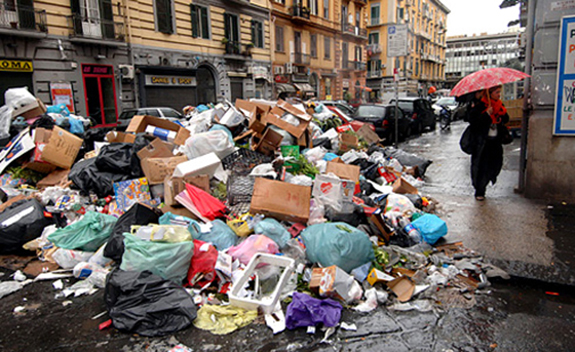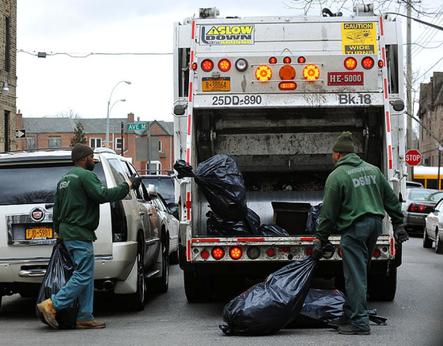|
Imagine living in a city like New York without the infrastructure of sanitation and trash pick up. Back in the 1920-30’s trash was a huge problem in New York. With so many people rushing to live in the city, trash was often dumped in the streets and rivers. The picture above gives you an idea of what a mess things were! I mean have you ever stopped to think about what your town, city, or state would look and smell like if no one picked up your waste? Well in New York City trash is picked up daily and the waste is shipped off to several states and then put into landfills. Just think about how much money, planning, and infrastructure is needed to make this service run each day! “I strongly believe that sanitation workers are the most important labor force on the streets of the city...They are the first guardians of public health. If they’re not taking away trash efficiently and effectively every day, it starts to spill out of its containments and the dangers inherent to it threatens us in very real ways. Diseases we’ve had in check for decades and centuries burst forth again and start to harm us.” Robin Nagle- What I Discovered in New York City TrashTed Talk I for one admit that I have taken waste management for granted and never thought about the process until my trip to Haiti. During my time there, I was confronted with trash. It was everywhere in Port au Prince. I mean mounds of trash and litter scattered throughout the city. Where did it all come from? Why wasn’t anyone picking it up? I mean the canals were packed with plastic bottles, bags, and boy did I see a lot of Styrofoam! Kids were playing on top of it and women were selling fruits and vegetables near it. Then I thought, what happens when it rains? Well, if it rains, the bacteria from the waste spreads into the water and soil, creating a river bed of trash that leads right into the ocean. The trash spreads and disease like Cholera spread. My heart and mind were so conflicted about the trash problem that the first night in Haiti I penned the following poem in my journal: "The rooster crows Complex is actually an understatement. The problems in Haiti are monstrous but they are not the only country in the world struggling with trash. For places like Hong Kong, Cairo, and slums throughout Africa and India trash is a big problem. So if you lived in a place like this, what would you do with all the trash? Some Haitians are not letting their circumstances defeat them--this is what I love about the Haitian people. They are expressing hope by turning the trash into treasure. Watch the following video to learn more: You see some people look at the trash and shake their heads in disgust. Some shout from the rooftops “Cholera is coming” while not providing any solutions. And then some get close and help one family at a time to get out of the mess. Papillon Enterprise is not only making use of recyclable materials but providing jobs for hundreds of families while 40% of the population is unemployed. This amazing business is taking care of the trash and circumventing the cycle of families sending their children off to live in orphanages. Haiti’s trash is a symptom of many problems and I for one am not knowledgeable enough to tackle it by offering solutions. But as a new lover of the people, I believe that those who live abroad, can do something to help. If you’d like to help one person, one family rise above their current circumstances, please consider purchasing this beautiful Haitian jewelry from Papillon. Another way we can move forward is to stop taking our sanitation services for granted. We should live with grateful hearts that we have the resources for proper and efficient waste management and pray for our brothers and sisters of many lands who aren't as privileged. Robin Nagle in her Ted Talk encourages each of us to “In the flow of your days. In the flow of your lives, next time you see someone whose job is to clean up after you, take a moment to acknowledge them. Take a moment to say thank you.” And last but not least--we should all try to live in a way where we learn ways to reduce our personal trash by recycling, composting, and reusing goods. If we all make more of an effort things can and will change around the world.
0 Comments
Leave a Reply. |
Murray FamilyI've been married to my best friend Bryan Murray since the year 2000. Now we have four incredible children and a super full life with extended family and friends. Archives
November 2022
Categories
All
|


 RSS Feed
RSS Feed

